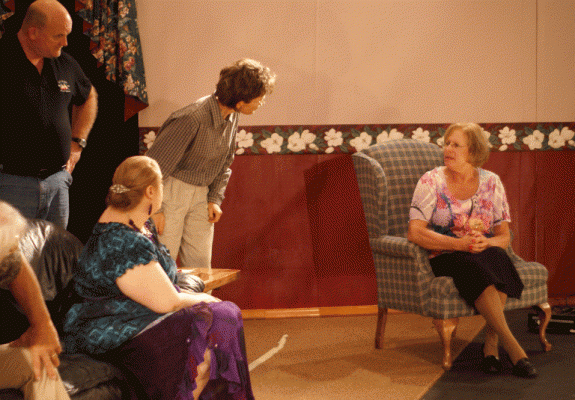 As I write this, we’re in the final stretch to complete the full production of Jessa Pruit’s Jams and Preserves, a debut comedy organized as a fundraiser for First Lutheran Church, in Kearney, Nebraska. By the time you read it, the whole process may well be over. Nearly two months’ effort went into only three showings on a makeshift stage with a shoestring budget. And no one has more on the line than me.
As I write this, we’re in the final stretch to complete the full production of Jessa Pruit’s Jams and Preserves, a debut comedy organized as a fundraiser for First Lutheran Church, in Kearney, Nebraska. By the time you read it, the whole process may well be over. Nearly two months’ effort went into only three showings on a makeshift stage with a shoestring budget. And no one has more on the line than me.Though this is neither the first play I’ve written to receive a full staging, nor the first play I’ve directed, the magnitude of firsts remains nevertheless significant. This is my first full-length staging as a writer, my first full-length comedy, my first play longer than a one-act as a director, the first play I’ve directed in nine years. This experience has hit me with uncounted lessons in quick succession.
Most importantly, this is the first time I’ve directed my own work. I once swore I would never do that, because I read a newspaper report on a cast that grew frustrated with Edward Albee’s inability to direct his own classic, Who’s Afraid of Virginia Woolf? Because Albee focused on the language to the exclusion of action, the actors had to push against their own director to create a dynamic stage picture. I didn’t want to be that guy.
But, when I was offered the opportunity to direct a play as a fundraiser for the church, I have to admit, my first loyalties showed their faces. I write; that’s what I do, that’s who I am. So I made my directing conditional upon permission to write my own play. And that’s what I did— though, without any audition process, I had to accept every actor who wanted to participate.
 The learning curve in this process has been constant. For instance, I’ve had to work to deadline pressure like I’ve never had before. I had barely a week before knowing who my cast would be, and needing to present them with a script. I’ve had to write with the rehearsal already in process, giving my actors their scripts in dribs and drabs. They’ve been remarkably accommodating, too, especially since my cast received their final rewrites only a week before they were scheduled to act off book.
The learning curve in this process has been constant. For instance, I’ve had to work to deadline pressure like I’ve never had before. I had barely a week before knowing who my cast would be, and needing to present them with a script. I’ve had to write with the rehearsal already in process, giving my actors their scripts in dribs and drabs. They’ve been remarkably accommodating, too, especially since my cast received their final rewrites only a week before they were scheduled to act off book.Because of the volunteer nature of the process, I’ve scrambled to compromise in the most productive ways. As a director, I see my role not as a dictator, but as a surrogate audience, and my job as helping my actors achieve the best show they can put on. Because most of my cast has very limited acting experience, and some are acting for the first time, that process has meant me fining new ways to communicate that don’t apply with seasoned actors.
But I’ve enjoyed the trade-off that, as playwright, I could help my actors put on their best show by showcasing their greatest strengths. Because this is a church activity, and because I already know most of the performers on stage, I’ve been able to write roles that reflect their speech rhythms and natural mannerisms. Not that I have my actors playing themselves; just that they don’t have to wrap their tongues around somebody else’s style of speaking.
The writer-director finds himself in a strange position. Those roles are usually separated, and even when the writer is present to fine-tune a world debut production, the writer is usually expected to sit in the back of the auditorium, taking notes, and only communicating with the actors through the director. The writer, even in this public art, is a private role, while the director is more external, communicative, and public.
Mingling the two roles means I need to wear two hats at once, which is never easy for anyone. I must trust to the artistic vision of the words, and stand fast where I believe changes would weaken the show, even as I must cater to my actors by giving them what they need. The writer and director can usually avoid cast pressures by blaming limits on one another. Not so when you fill both roles.
Yet I’d recommend the experience to any writer, director, or theatre professional. I have the joy of seeing the skeleton of my writing, which is always just a guidepost for someone else’s imagination, augmented by my actors. So many times I’ve watched my cast, realize they’ve done something I never even dreamed, and felt simple joy. They’ve taken my work so much further than I ever could.
No comments:
Post a Comment